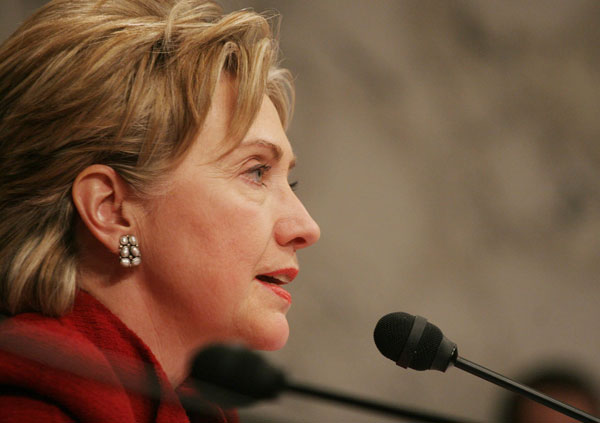A Roadmap to Clinton’s Confirmation Hearing
The next secretary of state is sure to face difficult foreign policy decisions. Here are four to watch for during Sen. Hillary Rodham Clinton’s confirmation hearing.
Jul 31, 20208.4K Shares423.5K Views
Sen. Hillary Rodham Clinton (D-NY) (WDCpix)
Rarely does the president of the United States nominate a bit player for secretary of state. Colin Powell, secretary from 2001 to 2005, was the foremost Army officer of his generation. Warren Christopher, secretary from 1993 to 1997, had been deputy secretary under Jimmy Carter and deputy attorney general under Lyndon Johnson. George Schultz, secretary from 1982 to 1989, had been secretary of the treasury andsecretary of labor.
Illustration by: Matt Mahurin
Hillary Rodham Clinton, whose confirmation hearing begins Tuesday morning, is in this tradition. A giant of Democratic politics, had it not been for the unexpected ascendancy of Barack Obama, she might be the 44th president of the United States herself. Clinton spent her eight years as the junior Senator from New York building up a foreign-policy portfolio and a reputation for diligence, thoroughness and attention to detail. Her nomination to become the 67th secretary of state faces few political obstacles as a result.
But that’s not to say Clinton is an open book. Her foreign-policy instincts tend to be more hawkish and more establishmentarian than Obama’s — a distinction that contributed to Obama’s victory in the Democratic nomination battle last year — creating much speculation about the direction of U.S. foreign policy under an Obama-Clinton team. As Clinton goes before the Senate Foreign Relations Committee to explain how she envisions her job, sets her priorities and views the challenges of a post-Bush approach to foreign affairs, here are four important issues for the next Secretary of State that deserve particular attention.
The Israeli-Palestinian Peace Process.
With Israel stretching its war on Gaza into its third week despite a U.N. Security Council demandfor an immediate ceasefire, Obama has kept to the line that he won’t say anything substantive about the crisis while President Bush is still in office. Clinton won’t have that luxury. She’s sure to face questions about the prospects — and, indeed, the wisdom — of brokering a peace deal between the Israelis and the Palestinians in the wake of the Gaza crisis. Similarly, given Obama’s simultaneous insistence on the necessity of negotiating with U.S. adversaries and his seeming exception for Hamas, Clinton may well face questions about whether and how the U.S. might engage in negotiations with a Palestinian political faction that refuses to recognize the existence of the state of Israel and that the State Dept. deems a terrorist group.
Nominees rarely use confirmation hearings to unveil their prospective subcabinet appointments, since to do so would appear presumptuous. But it’s still worth paying attention to whether Clinton would rely on a series of high-profile envoys to hotspots like the Middle East to troubleshoot problems like the Israeli-Palestinian issue, as has been reported. One such prospective envoy, Daniel Kurtzer, a former U.S. ambassador to Israel and Egypt, recently outlined a proposal to secure a peace deal with the Palestinians that bypasses Hamas. ** **While Clinton is unlikely to say anything about whom she might tap for her envoyships at today’s hearing, some longtime Israeli/Palestinian observers want to hear urgency from Clinton about securing a resolution to the 60-year-old conflict.
“We’re looking for a recognition of the urgency — that time really is about to run out on the two-state solution,” said Jeremy Ben-Ami, a former deputy White House domestic-policy chief under President Bill Clinton, now the executive director of J Street, a progressive Jewish lobbying group, in an email. “We’re looking for a recognition that the U.S. has to play a more active role – we can’t simply facilitate discussions, we need to actively put the solutions on the table and bring the parties to agreement.” In keeping with Democratic orthodoxy and Clinton’s statements for decades, the secretary-designee is likely to say that resolving the conflict is a top priority, but Ben-Ami said he wants to see whether Clinton feels “ending this conflict is an essential American interest.” and vital to our efforts to address other threats in the region and to restoring our reputation around the world.” **
**
Post-SOFA Iraq.
For Marc Lynch, a professor at George Washington University who focuses on Mideast politics, the key question for Clinton when it comes to Iraq is “Do you agree with Odierno and Mullen?” referring to Gen. Ray Odierno, U.S. commander of troops in Iraq and Adm. Mike Mullen, the chairman of the Joint Chiefs of Staff. The signing of the Status of Forces Agreement (SOFA) with the Iraqi government last year provides a mutually-assured path for U.S. troops to exit Iraq by the end of 2011, but that’s not pleasing everyone in the U.S. government. Both Mullen and Odierno have expressed more cautious positions on troop withdrawalsthan the SOFA envisions, with Odierno appearing to indicate that he considers the agreement an obstacle to work aroundinstead of the new rules of the road for the U.S. mission in Iraq. (Update: Odierno respondedto his position on SOFA after publication.)
Another issue lurking under the radar is how the State Dept. will assume a fuller leadership role in Iraq. Veterans of the U.S. mission in Iraq, particularly from the military but also civilians, have grumbled that the State Dept. has left most of the substantive interactions with the Iraqi government to the U.S. military, which doesn’t want that mission. Under the SOFA, the massive U.S. embassy in Baghdad is supposed to take the lead in all non-security-related U.S.-Iraqi initiatives. Some in the outgoing Bush administration believe that embassy officials wish to act as a typical governmental interlocutor with the Iraqis, rather than remain an active partner for the formulation of a stable, cross-sectarian political order. The tone Clinton sets may be important here.
On Foreign Policy magazine’s website Monday, Lynch wroteof the SOFA, “President-elect Obama will have an initial window of opportunity to establish credibility at home, in Iraq, and in the wider regional and international arena. An overly cautious approach to the withdrawal of combat forces would quickly squander this opportunity.”
One thing Iraq-watchers in the U.S. fear is that if the Iraqis perceive that the U.S. isn’t honoring its withdrawal commitments under the SOFA, they’ll force the U.S. out in 2010, owing to a provision in the Iraqi legislation that passed the SOFA providing for a popular referendum on the unpopular U.S. presence. That would be a withdrawal that occurs significantly faster than U.S. commanders like Odierno desire. What Clinton thinks about the SOFA isn’t clear — nor is how she views the State Dept.’s overall role in Iraq. ** **
Afghanistan Strategy.
Perhaps the biggest looming political-military controversy on the Obama administration’s horizon is the Afghanistan war. The war’s fortunes are deteriorating significantly, with U.S. troop deaths on the rise over the past two years. In response, Obama said for 18 months on the campaign trail that he planned on increasing the U.S. troop presence in Afghanistan. In keeping with that view — which seems to be a bipartisan consensus position — over the course of 2009, the military plans to send around 20,000 more troops to that often-neglected war. Clinton sounded similar notes on the campaign trail, contending that Afghanistan should get “as much, if not more attention” from the U.S. than Iraq.
But it hasn’t been clear what that actually means. Prominent Democratic members of Congress have startedto voice concernsabout the need for a clear, achievable strategy in Afghanistan if the administration is to expect support on Capitol Hill for a troop increase. Additionally, progressives in the blogosphere are beginning to push back on the troop increaseas well. If a broader change in strategy doesn’t come forward soon, it’s possible that the administration might face a circumstance that the Bush administration never envisioned: a cratering of public support on a heretofore popular war.
Brandon Friedman, a U.S. Army veteran of Afghanistan and prominent member of the VoteVets military lobby group — which did not endorse anyone for president — says he expect to hear Clinton discussing the non-military components to the administration’s Afghanistan plans. “I’d expect her to talk about leveraging America’s soft power in order to complement the additional forces heading into the country,” Friedman said. “And I think she’ll couch it in terms that put the U.S. diplomatic role on equal or greater footing with the defense one, which would represent a significant shift from the past administration.”
The course of that diplomatic role is controversial. Hamid Karzai, the president of Afghanistan, has proposed opening talks with the Talibanto end the Afghan insurgency and has apparently acquiesced to a U.S. effort to organize and deputize tribal militias as auxiliaries against the Taliban. Does Clinton think those efforts — both fraught with both peril and opportunity — are worthwhile?
Private Military Contractors.
Perhaps the only high-profile national-security issue where Clinton staked out a position to Obama’s left was on the use of private military contractors. Last February, Clinton introduced a bill — it didn’t pass — to ban what her office called “mercenary” firms from operating in Iraq and Afghanistan. “These private security contractors have been reckless and have compromised our mission in Iraq,” Clinton said in a prepared statement, referring to private security companies performing traditionally military missions. “The time to show these contractors the door is long past due.”
Yet such companies protect the U.S. diplomats that Clinton seeks to lead. In particular, the department has what’s known as a World Wide Personal Protection Services contract — worth nearly $2 billion — with the Blackwater, Triple Canopy and DynCorp private-security firms. The contract, which a State Dept. inspector general report found to be laden with corruption, is up for renewal in September. If the contractors aren’t protecting the diplomats anymore, the protection mission will fall to a military that faces its own burdens in both Iraq and Afghanistan.
It’ll be up to Clinton and to the Pentagon to work out a security-contractor-free regime for U.S. diplomats in the two warzones — that is, if Clinton still desires one. Her office and the Obama transition have ducked inquiries from TPMmuckraker’s Justin Elliott on what Clinton’s plans are for the future of security contractors. And it remains to be seen what sort of priority she would devote to ending State’s reliance on contractors given the already-heavy workload of U.S. foreign policy. As well, recent reports indicate that she plans to retain Amb. Patrick Kennedy as undersecretary of state for management. After Blackwater guards shot and killed 17 unarmed Iraqi civilians in Baghdad, Kennedy wrote a report in 2007 for Secretary Condoleezza Rice on reforming contractor activities for the department, but did not recommend terminating their usage. He recently toldThe New York Times’ James Risen that “We cannot operate without private security firms in Iraq… If the contractors were removed, we would have to leave Iraq.”

Hajra Shannon
Reviewer
Latest Articles
Popular Articles

